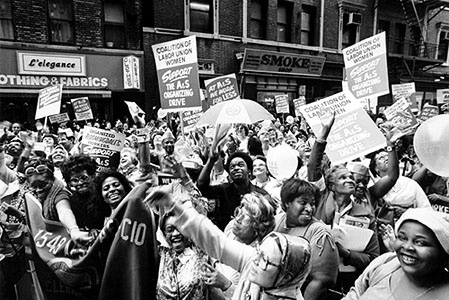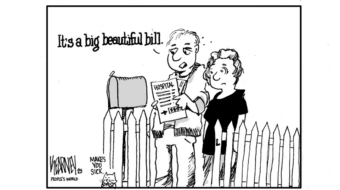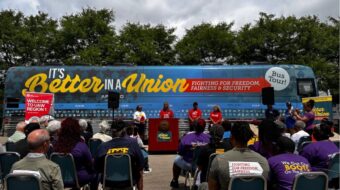
WASHINGTON (PAI) – The Labor Department’s Women’s Bureau, faced with small size, a budget freeze and potential cuts, will emphasize research on working women’s issues, outreach to workers and – despite a potentially hostile GOP House majority – paycheck fairness, the agency’s director says.
Speaking Nov. 23 to the Clearinghouse on Women’s Issues, Director Sara Manzano-Diaz added, ruefully, that she frequently finds the agency tackling the same issues it did when it was created 90 years ago.
One of those is equal pay for equal work, she notes. “I’m a little disappointed we didn’t get the Paycheck Fairness Act passed” in the Senate, where lawmakers failed, by two votes, to halt a planned Republican filibuster against the legislation. “But we’ll keep trying,” Manzano-Diaz added.
The Women’s Bureau was established in 1920, just after women won the right to vote in all elections. Over the years, it has tackled issues such as equal pay, work-life balance, the Equal Rights Amendment, child care on the job – and tax credits for child care – and the Family and Medical Leave Act.
But with 58 workers, down from 100 in its heyday years ago, and a program budget that, after salaries, totals $1.2 million, the Women’s Bureau must turn to the private sector to help it advance the rights and economic prospects of female workers.
It’s also making the case to companies that the issues it tackles and the causes it champions are good business sense, too, Manzano-Diaz told the Nov. 23 meeting.
“We’re making the case in business-to-business discussions, especially with small businesses,” at regional conferences that both the bureau and its parent agency, the Labor Department, have hosted around the country.
Workplace flexibility is an advantage to business short-term and to the society long-term, the bureau tells companies. The issue, which the bureau pushes, lets workers, both men and women, adjust their schedules to family needs, such as caring for sick children and elderly parents.
The advantage to business, Manzano-Diaz says she tells businesses, is that they don’t have to train replacement workers and that they get higher productivity from present workers whose minds aren’t distracted from their jobs by worry.
The advantage of flexibility to workers is they get time to retrain themselves for jobs in the 21st century workforce, thus increasing their earning and income capacity while becoming more valuable to employers, or that they get time to take care of loved ones
“It even leaves less of a carbon footprint,” she added, because flexible hours mean workers can avoid sitting in traffic jams during rush hour.
Some companies get it, Manzano-Diaz said. “There are 100 CEOs who understand the workforce of tomorrow is the young girls and women of today,” she said.
But not all do. Corporate attitudes towards women at work, polls show, still penalize women in the workforce, even those without families. A young woman college graduate with identical credentials to her male counterpart, and taking the same position in the same field, still faces a starting salary penalty of up to 5 percent and the gap only widens as the two move up the corporate ladder.
Polls and intensive surveys by both the Women’s Bureau and think tanks also show women pay a large wage penalty when they take time off from work to care for families.
To overcome these obstacles, and its small staff, the Women’s Bureau is intensifying its outreach to workers, especially to tell them about their rights to equal pay and treatment on the job. It’s also reaching out to the private sector groups as partners in the information effort.
But the bureau’s efforts aren’t all carrot and no stick, Manzano-Diaz said. Her bureau, the Justice Department, other sections of the Labor Department, the federal Office of Personnel Management and the Equal Employment Opportunity Commission established a joint task force to pursue equal pay violators.
Outreach to the private sector may become even more important for the Women’s Bureau. Democratic President Barack Obama, who appointed Manzano-Diaz, has already announced a two-year freeze on spending for so-called “domestic discretionary programs,” including those at the Labor Department. And the last time the Republicans ruled the House, they tried to eliminate the Women’s Bureau entirely.
“We’ll figure out now how to be partnering with as many of you as possible,” she told members of the women’s groups and unions gathered around the Nov. 23 luncheon table. “We’ve built goodwill and good relationships within the women’s community. So we’ll use them to leverage our research and work together with you for the right reasons.”
Photo: “These are the hands that built America”










